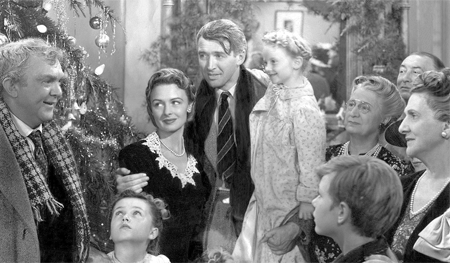It’s a Wonderful Internet: What if the internet had never been “born?”
The coronavirus pandemic has produced unprecedented disruption of our generation, but it could have been So. Much. Worse. Jeffrey Cole explores what our pandemic experience would have been if—like George Bailey in “It’s a Wonderful Life” -the internet had never been born.
By Jeffrey Cole
The internet won!
In the middle of March, with little warning or preparation, we moved our lives online.
What couldn’t be transferred online simply stopped. Movie theaters, concert halls, and theme parks closed. Baseball and basketball suspended their seasons, and it is still not clear if they will resume, or if the football and hockey seasons will ever start.
 Almost all dining in restaurants stopped, and many people were hesitant to eat even at outside tables at the small number that stayed opened. Travel came to a standstill with airlines barely operating and hotels facing little occupancy. Cruise ships will not see passengers for a very long time.
Almost all dining in restaurants stopped, and many people were hesitant to eat even at outside tables at the small number that stayed opened. Travel came to a standstill with airlines barely operating and hotels facing little occupancy. Cruise ships will not see passengers for a very long time.
If it couldn’t happen on the internet, it didn’t happen. If it could, it did.
Within a few days, most education migrated from the classroom to the internet. Office workers moved meetings from conference rooms and hallways to Zoom or Microsoft Teams.
Shopping in grocery stores was one of the few things we continued to do while quarantined, but many bought food online for the first time. Almost all other buying moved completely online. Amazon, already on the way to taking over the world, got even bigger. Of people who had never bought anything online before the pandemic, 37% became internet consumers within two months.
With theaters closed and concerts cancelled, we moved online for most of our entertainment needs. The established streaming players—Netflix, HBO and Hulu—with their deep catalog of entertainment that most of us wanted to watch but couldn’t previously find the time, have done extremely well. Apple and Disney, introducing their streaming services late last year, were ready when the pandemic came. They have firmly established themselves as the audience is especially hungry for new content.
For channels introduced during the crisis trying to build an audience and brand, like Quibi and HBO Max, the going has been difficult. It’s too early to know what will happen with Peacock, but a free service is particularly welcome at this moment. We also returned to broadcast and cable television.
The internet thrived and has been our lifeline to the old world we used to inhabit.
Of course, to move your pandemic life online you have to have a computer, smartphone, or tablet as well as enough bandwidth for four people to be learning, working, watching, and playing online at the same time.
More importantly, you had to have a job that could be performed online or attend a school that was ready to teach over the web. Our recent COVID-19 Project showed that 76% of us can do at least a little bit of our work from home on the internet. But 24% cannot do any of it. For those with only a high school education, 51% can’t. While the quality of online education has varied widely, those who attend smaller, private schools have had better opportunities during the pandemic (and every other time) than those in larger, public institutions.
As difficult as the pandemic has been—particularly with loneliness, anxiety, and depression—it is sobering to think how much worse it would have been without the internet. Work, school and relationships would have all suffered more than they did. For many of us, it was one of our greatest fears that our internet connection would fail, and it might take two weeks to get someone to the house to bring us back to the world.
While there are people who put an antenna on the roof and get free television, most of us have cable or satellite subscriptions. Streaming adds even more. Subscribing to the top four streamers adds around $40 a month to household costs.
Since March, the work that has been done, the learning that has occurred, and the entertainment that has been watched have almost all been on the internet.
As difficult as all this has been on our psyches, budgets, and relationships, it could have been much worse.
The big “What If?”
To borrow a question from George Bailey in one of my (and everybody’s) favorite films, It’s a Wonderful Life: what if the internet had never been born?
What if during the pandemic the technologies that had changed our lives were fax machines, cable television, VCRs and cordless phones?
Let’s take a look at living through the pandemic without the internet as an essential part of everyday life.
Work: Although we often grow weary of a long day of Zoom conferences, this is what has kept us productive. If the web had not been invented, every office would not now be examining new work schedules and evaluating whether they need as much office space as they had in January, or if they need any at all. Our Project shows that—post vaccine—of those who can work at home, 60% plan to come into the office only a day or so a week and 30% plan to never be there.
Collaborative tools like Google Docs wouldn’t exist. Instead, we would have to mail our work back to the office, or get in our cars to drop it off somewhere. Phone conferences, particularly with more than 3 people, would make it difficult to maintain focus. Setting up large calls might take days as everyone tried to coordinate schedules without online calendars.
Schools: Phone conferences for classrooms would simply be one-way: students would listen as teachers lectured over the phone. Like work, assignments would be mailed to students. Tests could not be secured. They would be open-book and also returned by post or dropped off.
And this limited method of “teaching” would only work for those in middle or high school. Imagine trying to get 10 or more second graders on the phone for a class. For them, learning would probably extend no further than teachers mailing out recommended television programs (documentaries and movies) .
Learning would come to a standstill. It wouldn’t be a whole lot better for everyone else, even college students. It would be like the correspondence courses of the past. Focus would be difficult to maintain as comprehension and actual learning suffered.
Buying: Tracking Amazon packages on the web and watching them get closer to my home is one of the high points of my day. When they arrive, there is a letdown as there is no longer a package to look forward to. The cure is to go online and buy more.
In an internet-less world, we could still order products by phone. There would be no tracking, and the selection of what we could buy would be much more limited. While most of us still go to the grocery store, with the internet it was possible to get all the goods and products we need without ever setting foot past our front doors. For a while, shipping times got longer (we have been used to them always getting faster, so the delays have been difficult to deal with). Of all our lifelines during the pandemic, Amazon and other online sellers have been the ones that have kept life closest to the way it was.
Entertainment: Without the internet, Netflix still would have been the entertainment star of the pandemic. But it would have been the old “red envelope” Netflix. We would be able to get five DVDs at a time and then have to return them by mail to wait for new content. The way we consumed content, those five would have had to be replaced every day or two. And with all of us hungry for entertainment, the competition for DVDs would have been intense: full of waiting lists and delays.
There would have been network television (already in re-runs as new content cannot be produced) and cable channels. It’s hard to overstate the wealth of content available on demand that the internet brings into our home.
Family Life: Our work shows that family relationships held up well in quarantine. Parents report by 7-1 that relationships with their children improved. Partners report theirs improved by 3-1. These improvements came as families could spend enormous blocks of individual time working, learning, watching, or playing games on their computers, phones, and tablets. In some instances, this time coupled with sleep reduced family time to four to seven hours a day.
Would relationships have improved as much as they did if we were spending 15 hours or more together? Our Project showed that little time was spent reading or doing solitary activities that did not involve digital technology. Family harmony might have been very different.
With theaters closed and concerts cancelled, we moved online for most of our entertainment needs. The established streaming players — Netflix, HBO and Hulu– with their deep catalog of entertainment that most of us wanted to watch but couldn’t previously find the time, have done extremely well. Apple and Disney, introducing their streaming services late last year, were ready when the pandemic came. They have firmly established themselves as the audience is especially hungry for new content.
Videoconference services like Skype, FaceTime, Zoom, and WhatsApp have all allowed us to feel connected to the lives of our family and friends who were not quarantined with us. In a no-internet world, there would have been phone calls. But with the phone, could grandparents watch their grandkids take their first step or do their homework with them?
As difficult as the pandemic has been—particularly with loneliness, anxiety, and depression—it is sobering to think how much worse it would have been without the internet. Work, school and relationships would have all suffered more than they did. For many of us, it was one of our greatest fears that our internet connection would fail, and it might take two weeks to get someone to the house to bring us back to the world.
The internet won. It became as important as water, food, and electricity. Even those who have still never gone online had a connected family member or friend to help provide some of the benefits.
Before March, for most Americans it was difficult to imagine that the internet could become an even more important part of their lives.
During the pandemic, it did.
Jeffrey Cole is the founder and director of The Center for the Digital Future at USC Annenberg.
__________

Jeffrey Cole is the founder and director of The Center for the Digital Future at USC Annenberg.
See all columns from the center.
July 22, 2020

